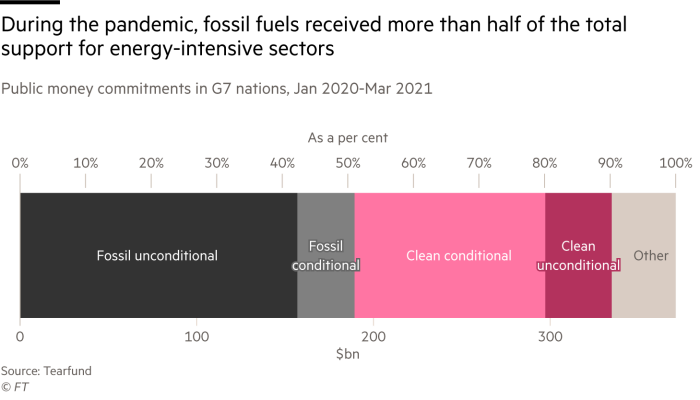G7 criticised for Covid bailouts with no ‘green strings’ attached
The world’s leading economies have allocated more than $189bn of pandemic recovery funds in support of fossil fuels, despite government pledges to “build back greener” and cut carbon emissions.
More than half of $372bn given by G7 countries to energy-producing and consuming activities from January 2020 until March this year was for coal, oil and gas, according to research from Tearfund, a development charity, backed by two independent think-tanks.
Most of the money was handed over “no strings attached” without any demands on the companies receiving help to reduce their carbon footprint.
“The economic recovery post-Covid is a huge opportunity to accelerate the transition to a green economy,” said Rich Gower, a senior associate at Tearfund. “At the moment, the G7 are not taking that opportunity.”
Pandemic lifelines highlighted in the report included the German government’s €9bn bailout of airline Lufthansa and $10bn in US government support for airports.

Around $147bn went towards clean energy projects, such as a tax incentive in Italy to encourage people to make their homes more energy efficient.
G7 countries represent around a quarter of global carbon emissions, though only account for around 10 per cent of the world’s population.
Governments have raised their green commitments this year ahead of the UN’s climate change conference, known as COP26, which takes place in Glasgow in November. More ambitious emissions reduction plans have come alongside promises to inject money into developing new green jobs and industries.

In May, G7 countries vowed to stop all new financing for overseas coal projects by the end of this year, and to make “accelerated efforts” to limit global warming to 1.5C relative to pre-industrial times.
However, the Tearfund research found that much of the recovery spending so far was at odds with plans to adopt cleaner sources of energy.
In a separate report published on Wednesday, the International Energy Agency said there had been an increase in approvals for coal-fired power plants in 2020, driven by projects in China and some other Asian countries.
Upstream oil and gas industry investment is expected to rise by around 8 per cent this year, but remain below pre-crisis levels, the IEA added.
“Governments need to go beyond making pledges to cut emissions and take concrete steps to accelerate investments in market-ready clean energy solutions and promote innovation in early-stage technologies,” said Fatih Birol, the IEA’s executive director.
According to the Tearfund report, the governments of Australia, India, Korea and South Africa — the G7 summit guests — have all supported the expansion of coal production either financially or with policy measures since January 2020.
The researchers recommended that the G7 adopt a “do no harm” principle for all spending, which should include attaching “green strings” to any support for fossil fuel intensive sectors, and putting an end to public money for the production of coal, oil and gas.
The G7 should also use their influence to urge development banks to align their activities with limiting global warming to 1.5C, the report said.
“Every penny matters,” said Gower. Spending on dirty energy today is “perpetuating fossil fuels into the future.”
Climate Capital

Where climate change meets business, markets and politics. Explore the FT’s coverage here.
Are you curious about the FT’s environmental sustainability commitments? Find out more about our science-based targets here